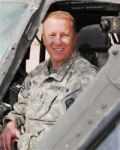CONTINGENCY OPERATING BASE SPEICHER, Iraq, May 13, 2011 — You can see the twinkle in his eye as he sits down.
Army Chief Warrant Officer Wayne Wade — father, husband and pilot — would rather spend this interview talking about his 18-month-old twins, Ross and Sydney, or his wife, Samantha, and how he is going on two weeks of rest and recuperation leave.
 |
| Army Chief Warrant Officer Wayne Wade of the Mississippi National Guard is serving his third deployment to Iraq. U.S. Courtesy photo Click to enlarge |
“I’m going back to Fulton, Miss., spending time with my wife and kids,” he said. “I think we are getting a family portrait done, but that is it.” Wade is on his third tour to Iraq — this time with the Mississippi National Guard’s 1st Assault Helicopter Battalion, 185th Aviation Regiment. The battalion is attached to the 40th Combat Aviation Brigade, which is deployed to Iraq in support of Operation New Dawn.
Wade has flown a different type of helicopter on each of his tours in Iraq. On his first tour, he flew OH-58 Kiowa Warrior scout helicopters. He then moved over to AH-64 Apache attack helicopters, and now he flies UH-60 Black Hawk utility helicopters.
When he enlisted in the Army Reserve in 1987, Wade spent five years as a crew member and crew chief onboard UH‑1 Huey helicopters. This was enough, he said, to start him down what he called “the road to ruin” to becoming an accomplished helicopter pilot.
He flew as a UH‑1 medical evacuation pilot for the Army Reserve in Mississippi, followed by specialized training on the OH-58. After moving from the Reserve to the Mississippi National Guard, he was cross-trained on the AH-64 Apache.
Wade finished his training on Apaches just in time for the buildup before the start of the Iraq invasion in 2003. But the Army’s needs took precedence, and Wade became an individual augmentee with 3rd Infantry Division, flying OH-58s.
Ten months of boots on the ground and in the air as a scout for tanks was very different from today’s environment, Wade said. “Back then, there was almost no electricity in Iraq,” he explained. “We would land next to a [heavy expanded mobility tactical truck], fill up the bird and take off again. When we got tired, we would stop, sleep in the dirt, get up and do it again.”
Wade said he was part of the invasion all the way to Baghdad. “I looked at one of my journals from that time a while back and saw that it was several weeks into flying missions before there was an entry of, ‘Didn’t get shot at today,’ ” he said.
In 2006, he was deployed as an Apache pilot with the 36th Combat Aviation Brigade at the height of the surge. His flight company was based in Balad, but as a core asset, they were moved around a lot. Wade said he worked everywhere from Contingency Operating Base Speicher and south. He also spent some time in Basra supporting the British, he said.
“In ’06 and ’07, there were aircraft and people everywhere,” he recalled. “There were so many aircraft in the air you had to be careful that you didn’t run into each other.” Following his second tour in Iraq, Wade attended the Black Hawk transition course at Fort Rucker, Ala., eventually becoming an instructor pilot at a flight facility in Tupelo, Miss. He flew a civilian helicopter ambulance for a while out of Oxford, Miss. “But I decided that with the little ones on the way, the Army made better sense for us as a family,” he said.
This third tour has been spent at the controls of a Black Hawk utility helicopter. As a senior aviator with more than 3,400 hours, Wade said, he likes the theory behind the use of the Black Hawk to move assets around the country instead of by convoy. Wade became reflective when asked the differences between now and the beginning of the war in Iraq. “Now it seems that there is really a much greater sense of normalcy throughout the entire country,” he said. “The people in the country seem to be moving forward. Now it seems like the land is lush and there is farming, whereas before, when there was no electricity, all of the irrigation was gravity-fed, and there was a lot less farming going on.”
Source:
U.S. Department of Defense
Office of the Assistant Secretary of Defense (Public Affairs)

 von
von 